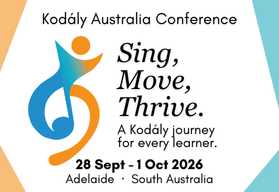KMEIA is proud to congratulate member Dr Judy Fromyhr who recently completed Doctor of Philosophy studies at the School of Education, University of Queensland.
Dr Fromyhr’s thesis, Lighting the fire, stories that musicians tell, investigates the ways positive early musical experiences may contribute to a sustained and lifelong engagement with music and, for some, the development of a career in music. Her research includes interviews with Professor Géza Szilvay and Csaba Szilvay, who are the founders of Colourstrings, an internationally recognised Kodály-inspired approach to learning string instruments. Professor Géza Szilvay is also the current Patron of KMEIA.
Please find below a short biography of Dr Fromyhr, her thesis abstract and a link to access the full dissertation. I encourage you to engage with this significant work in your professional reading and research.
Best wishes
Jason Goopy
President
Kodály Music Education Institute of Australia (KMEIA) Inc.
www.kodaly.org.au
Biography:
Judy Fromyhr is a senior lecturer in music at Australian Catholic University, Brisbane Campus. She is a fully-accredited Colourstrings violin teacher and a specialist in Kodály-based music education from early childhood to tertiary level. Judy has undertaken postgraduate studies at the Zoltan Kodály Institute in Kecskemet, Hungary, The East Helsinki Music Institute, Finland and the University of Calgary, Canada. Judy shares her passion and expertise with great warmth, and students love her engaging and encouraging approach.
Thesis Abstract:
Lighting the fire, stories that musicians tell
https://espace.library.uq.edu.au/view/UQ:9cd78ce
“The teacher open to the mystery, open to the wonder, open to the questions is the one who can light the slow fuse of possibility even for the defeated ones, the bored ones, the deserted ones” (Greene, 2001, p.146).
Musical development appears to progress in distinct and identifiable stages and music teachers have a role in facilitating the cognitive, emotional-artistic, and technical development that underpins the growth and expression of musical skill and knowledge (Bamberger, 1991; McAllister, 2009). For many young people, music teachers may indeed be the ones who light the fuse that ignites a passion for further engagement with music. However, even within a similar cohort of students with the same teacher and curriculum, some students succeed and others do not. This anomaly raises questions about the perceived decline in the engagement of young people with traditional forms of music activity (Sloboda, 2005, p. 361), and directs attention to other phenomena that may support persistence in music engagement.
This thesis explores the ways in which positive early musical experiences may contribute to a sustained and lifelong engagement with music and, for some, the development of a career in music. The study uses a narrative inquiry approach to listen to, document and reveal the authentic lived experiences of six participants who have made some kind of music activity the focus of their career and/or employment for most of their adult lives. Conversations with these musicians revealed information that informs our understanding of best practice in music education. Part of the wider story told here includes that of the researcher, and the thesis documents relationships and shared experiences between the researcher and the storytellers, and observations from working in the field over an extended period of time.
This research has been influenced by sociological and educational frames of knowledge that emphasise early music education and, more specifically, the acquisition and development of music skills. The research employed a semi-structured interview (or conversation) approach framed by a narrative emphasis on the three-dimensional inquiry space of place, time and interaction. Inquiry focused on the following topics: musical beginnings and individual experiences; family contexts; music in communities; formal music learning experiences; and peak experiences in musical settings (Sloboda, 1991a). Themes that emerged from the conversations are investigated and they reveal some important considerations with regard to the socio-cultural contexts of musical learning and development. Identification and investigation of the emergent themes has shed light and new meaning on critical and global contextual aspects of childhood music experience such as teacher/student relationships, curriculum, modelling, motivation, purposeful practice and parental support.



